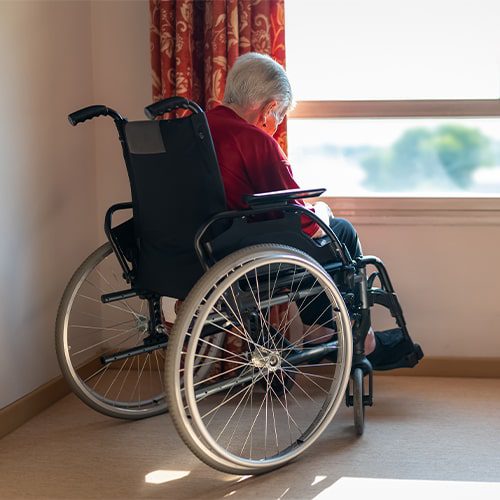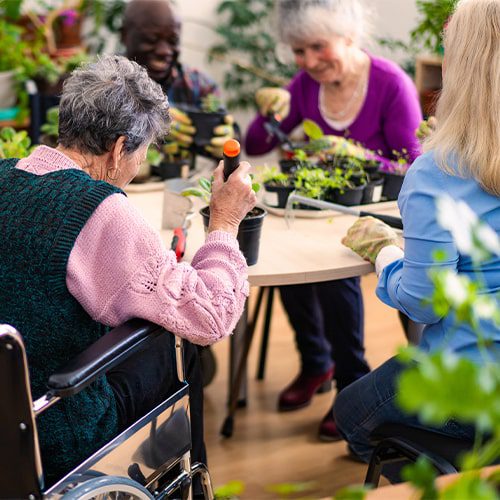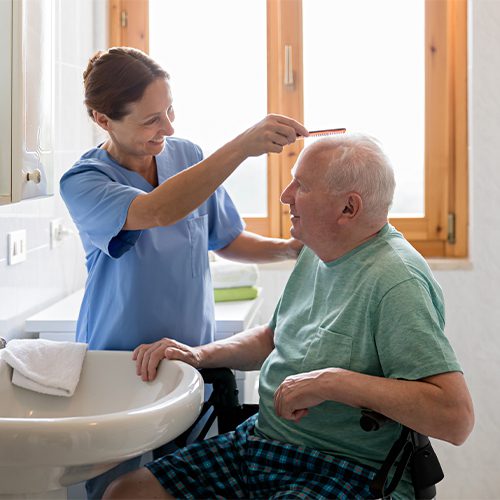Understanding Mental Health Support for the Elderly

Mental health is a growing priority within health and social care, with emotional and psychological well-being recognised as just as important as physical health. However, when it comes to elderly care, mental health is often overlooked. As loved ones age, the focus frequently shifts to physical needs – mobility, medical care, and day-to-day support – sometimes leaving emotional well-being behind.
Yet, maintaining good mental and cognitive health in later life is essential. Older adults face unique emotional challenges such as retirement, loss of loved ones, and changes in independence, which can increase the risk of mental health issues.
At LuxuryCare, we take a holistic approach to care, ensuring that every resident’s mental, emotional, and cognitive well-being is supported. By recognising and addressing mental health needs, we create an environment where residents can thrive socially, emotionally, and physically.
In this guide, we explore common mental health challenges faced by the elderly and how LuxuryCare supports residents in every aspect of their well-being.
Common Mental Health Issues in the Elderly
It’s a common misconception that conditions like memory loss and dementia are simply part of ageing. In reality, these are mental health disorders, many of which can be managed or slowed with the right support.
Mental health concerns among older adults are widespread in the UK:
- Depression – Affects around 7% of older adults, yet often goes undiagnosed.
- Anxiety – Impacts 10-20% of the elderly and can lead to isolation and fear.
- Memory loss and dementia-related conditions – More than 944,000 people in the UK live with dementia, and the numbers continue to rise.
With these figures in mind, it’s clear that elderly mental health care is just as crucial as physical care, especially in a residential care setting.
Identifying Mental Health Problems
Recognising mental health issues in older adults can be challenging. Symptoms vary from person to person and often present differently than in younger people. Stigma and fear around mental health or dementia may also prevent your loved one from opening up about their feelings.
It’s important to know the signs to look out for:
- Noticeable changes in mood or behaviour
- Increased fatigue or low energy levels
- Withdrawing from social activities
- Changes in sleep patterns, either insomnia or oversleeping
- Irritability or sudden mood swings
- Heightened anxiety or nervousness
Early detection of these symptoms allows for quicker intervention, better management, and improved quality of life.


Support Strategies for Caregivers and Families
Supporting an elderly loved one with mental health challenges takes patience, understanding, and empathy. Here are some strategies families can use:
- Create a safe space for open conversations – Encourage your loved one to share their feelings without fear of judgement.
- Promote social engagement – Activities and interactions with others help prevent loneliness and boost mental well-being.
- Know their limits – Social interaction is important, but overdoing it can cause overwhelm. Pay attention to signs they need a break.
- Look after yourself too – Caregiving is rewarding but can be exhausting. Respite care or support from others can help you recharge.
Taking care of your own mental health is vital in providing the best support for your loved one.
Professional Care and Treatment Options
Mental health care for the elderly is highly individualised. Treatment approaches depend on the specific condition, but the goal is always to support the resident’s emotional well-being.
Dementia care focuses on slowing progression and easing symptoms, as dementia currently has no cure.
Depression and anxiety can often improve with the right support, therapy, and lifestyle changes.
Treatment plans may include:
- Therapeutic activities such as gardening, music, or animal therapy
- Medication where appropriate
- Lifestyle adjustments promoting routine, purpose, and connection
At LuxuryCare, every resident receives a bespoke care plan created around their emotional, cognitive, and physical needs. These plans are regularly reviewed to ensure our support evolves with each resident.
Promoting Mental Well-being in Seniors
Whether or not a mental health diagnosis is present, promoting emotional well-being is a key part of elderly care. Families and care teams can work together to:
- Encourage regular physical activity tailored to ability
- Support participation in hobbies or new interests
- Facilitate social engagements, clubs, or group activities
- Explore volunteering or purposeful roles
A sense of purpose is vital for mental health, especially post-retirement. At LuxuryCare, we place great emphasis on helping residents find joy and fulfilment every day.
Mental Health Care at LuxuryCare
At LuxuryCare, we believe mental health support is an essential part of quality care. Our highly trained teams are skilled in recognising the early signs of mental health issues and acting quickly to provide compassionate support.
Here’s how we support our residents:
- Specialist staff training in dementia and mental health care
- Tailored, digital care plans continuously updated with mental health observations
- Comprehensive care needs assessments that consider past mental health history
- Vibrant social programmes designed to reduce isolation and promote engagement
- Regular reviews and family communication to ensure every resident’s needs are met
Whether your loved one stays with us for long-term residential care, nursing care, specialised dementia care, or short-term respite care, mental health is always a priority.
Our homes are filled with conversation, laughter, and meaningful activities, creating a nurturing environment where residents feel valued and supported.


Start your Care Enquiry with LuxuryCare
If you’re considering care home options for a loved one with mental health needs, we’re here to help. Book a visit to see first-hand how our dedicated team supports emotional well-being alongside physical care. Call us on 01202 037373 or enquire online today.














